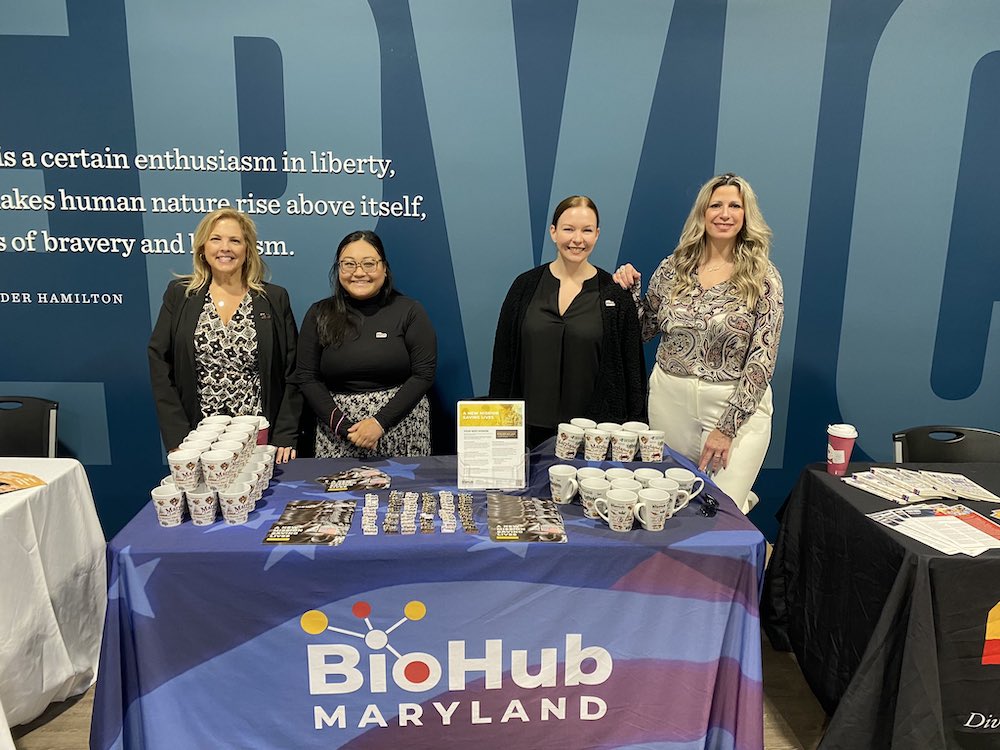Maryland Tech Council (MTC) today jointly announced the collaboration with Platoon 22, a nonprofit using workforce integration and wraparound services as a way to stem the tide of veteran suicides. The program specifically aspires to connect these veterans to the state’s life sciences and biotech ecosystems through MTC’s BioHub Maryland initiative, staffers of which will work with Platoon 22 to upskill veterans in jobs and disciplines that are in high need among life sciences employers.
Training will be administered in part through BioHub Maryland’s online training academy, which an announcement notes will teach elemental concepts in biomedical manufacturing, technical writing, quality assurance and other components within the broader life sciences industry.
Kelly Schulz, Maryland’s former labor and commerce secretary who became MTC’s CEO back in October, told Technical.ly this initiative arose out of work done by her predecessor Marty Rosendale and COO Michelle Ferrone. Schulz credited Ferrone with reaching out to Platoon 22, which was preparing to launch its Platoon Veterans Service Center around the same time BioHub Maryland had received an infusion of state and federal funds to grow. Both entities saw the chance to channel the mission-driven focus already familiar to the state’s military veterans — a community numbering around 400,000, according to Platoon 22’s own numbers — into an industry that MTC says drives $20 billion into the state’s economy.
“[Veterans] make great trainees and employees because of the training that they’ve already had,” Schulz said. “We want to be able to make sure that they have a path to move into, whether it be an entry-level position or [higher], but have those opportunities to continue to succeed because they are mission oriented. The life science community is mission oriented in saving lives, so there’re a lot of similarities.”
According to Schulz, the program, which grew out of a November memorandum of understanding between the two orgs, will start with them soliciting applicants. Program participants will start by taking BioHub Maryland’s online training this summer. The training draws in part from MTC’s committee meetings, through which member companies’ leaders have explained what kinds of skills the industry needs from people entering the life sciences market.
Schulz added that while this is a statewide effort, the partnership’s leaders aim to scale it in a way that might involve in-person components — particularly starting next year, at what an announcement described as BioHub Maryland’s own “state-of-the-art lab space” — as well as further collaboration with its regional chapters in Baltimore, Prince George’s County and the Chesapeake Bay region.
Advocacy for further life science opportunities
MTC announced this initiative the same week that it will host its second annual Advocacy Summit in Annapolis, during which Schulz and colleagues will present a mix of programming and networking events (including a ticketed leadership dinner) to connect tech and life sciences industry leaders with elected officials. Panels and fireside chats announced for Thursday will explore such topics as how to build a stronger biotech ecosystem, ways to center patients’ experiences as the industry grows and the impact of digital inequity throughout the state.
Schulz said that this is the MTC’s first advocacy-focused day in three years, thanks to COVID-era disruption. Lieutenant Gov.-elect Aruna Miller will deliver the leadership dinner’s keynote address.
Looking at the scope of this advocacy, as well as the veterans-focused programs and other aspects of the Maryland Tech Council’s work, Schulz is not yet too worried about the possible recession’s impact on the industries MTC represents. Besides a handful of layoffs at specific companies, she instead sees signs that the tech and life sciences industries are growing their capacity through lab space expansion and other moves. She cited examples of lab space being developed in Montgomery and Frederick counties, with more businesses being attracted to and investing in such facilities outside of federal subsidies. Moreover, she believes that elected leaders have a strong role to play in making Maryland an enticing place to do business.
“I’ve heard that there are about 3 million square feet of space that are being developed for future products right now, across the state — not just in the major hubs — and I think that’s a good sign,” she said. “We continue to hear from our members that they have a lack of workforce, so that’s always an opportunity to create more jobs with a more well-trained workforce. And if they need more workers, then that means that they’re growing.”
“I’m not going to dispute anybody that says there may be some sort of correction happening in the economy, but my numbers are not the ones that are seeing a massive correction,” she added.







